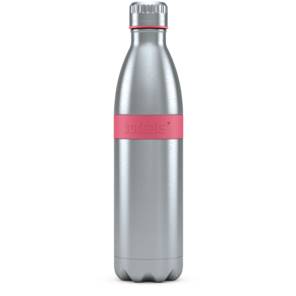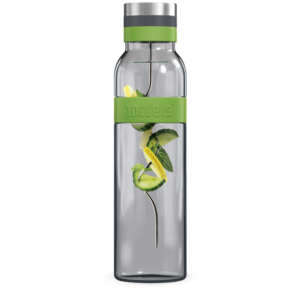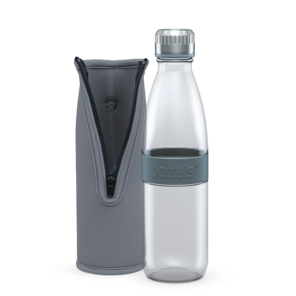![[Translate to Englisch:]](/fileadmin/_processed_/a/9/csm_ingwer-kurkuma_shot_4_542624ad4f.jpg)
A balanced diet plays a major role in a healthy immune system. Those who eat food rich in vitamins make a significant contribution to their physical and mental well-being.
Even in winter, when the access to fresh or even seasonal fruit is more difficult, you can still provide your body with the needed amount of fruit and vitamins. In this article we’ll show you some tips on how to properly prepare fruit and make it stay fresh for longer. But first:
Why are vitamins so important?
Vitamins are necessary for our cells to function. The body needs them for the metabolism, blood formation, bone building and healthy teeth and skin. Not all vitamins can be produced by the organism itself, so they have to be taken in with our food.
How do I guarantee a sufficient vitamin intake?
In general, if you are following a healthy and balanced diet, you are sufficiently provided with vitamins. Dietary supplements should only be used in exceptional cases when a vitamin deficiency is determined (by a doctor).
A balanced diet includes vegetables as well as fruit. The more fresh and untreated food we eat, the better. To ensure that fruits and vegetables retain their important nutrients during preparation, you should note the following:
1. The right preparation
Vitamins are highly sensitive and can be lost when preparing food in an incorrect way. Some vegetables or fruits release their vitamins into the water in the process of cooking. This (cooking) water is usually poured away. However, it can still be used, for example for sauces or stews. On the other hand, there are other foods that need to be heated in order to get to their vitamins in the first place. Cooked mushrooms for example, are rich in vitamins and easier to digest than uncooked ones. Others are healthier when uncooked and some, such as peppers or carrots, are vitamin bombs both ways – cooked or eaten completely raw.
Some types of fruit, such as apples should best be eaten unpeeled, because their peel is particularly rich in vitamins.
When cooking fruits & veggies, remember the follwoing: Steam every fruit and vegetable in as little liquid as possible – this way fewer vitamins are lost.
2. The right amount
The good thing about natural vitamins is that you cannot consume too much of them. However, it is different with artificial vitamins where you should definitely pay attention to the recommended daily dosage.
The rule says: If you eat three handfuls of vegetables and two handfuls of fruit a day, you are most likely reaching your daily dose of vitamins.
Fruits & veggies to drink – why not!
Sure, you can eat fruits and vegetables, but you can also drink them! For example, your vitamin balance can quickly and easily be stocked up with a delicious smoothie. Almost all types of fruit can be processed into a smoothie, but even vegetables such as cucumber, spinach, avocado or beetroot are doing great job here! You can consume your smoothie as a classic drink or in form of a delicious smoothie bowl with various toppings. Find our favorite recipes for smoothies on our blog or on our Pinterest account!
Infused water, also called detox water, combines vitamin and water intake and brings variety and taste to your drinking routine. There are no limits to creativity – from berries to citrus fruits to herbs such as mint or basil: Pretty much everything is suitable for a delicious and vitamin-rich water. You can find our favorite recipes here!
The much popular ginger shots give you a special vitamin kick as well and can be packed with all kinds of fruits & veggies. This usually works even without a juicer! Try our classic ginger-turmeric shots or our new creation – the pomegranate-ginger shots!
But what to do if access to fresh fruit and vegetables is difficult?
Make fruit last longer
Frozen fruits are a great alternative to fresh ones. You can freeze fruits in small portions and use them for smoothies, smoothie bowls or fresh tea from time to time.
Ginger shots can also be prepared in large quantities so that you consume them in portions throughout the week.
Ice cube trays with fruity contents not only make your drinking routine more colorful, they can also be an additional source of vitamins. Freeze previously cut fruit with a little water in your ice cube tray and enjoy small portions of fruit for infused water or iced tea afterwards.
By the way: Delicious and vitamin-rich drinks can also be prepared from the peel of some types of fruit – for example an apple peel tea! You can find the recipe here.
Storage tips for fruit
If you plan on stocking up with fruit, long-lasting fruits are better than those that need to be consumed right away. To make fruits last longer, it’s important to know how to store them. Citrus fruits such as lemons, oranges or clementines can be stored for up to two weeks if kept cool and dark. Stone fruit, e.g. peaches or plums also like it cool and are best kept in your fridge. Apples can last quite long when kept in the basement or in the pantry – however you should store them separately from other fruit, since they release large amounts of the ripening gas ethylene which causes other types of fruit to ripen (and spoil) more quickly.
That being said, fruit does not always have to be fresh: dried fruit also contains a lot of vitamins and can be consumed as a snack in between. Delicious tea tip: our apricot-mint tea made from dried apricots. Get the recipe here!
All in all, it's not that difficult to stock up on fruit vitamins at home. There are fresh fruits, but also frozen fruits and even dried fruits, which can all be made into delicious and vitamin-packed drinks and snacks.
When does a nutritional supplement make sense?
People who follow a balanced diet are usually well supplied with vitamins. However, there are groups of people that are at increased risk of suffering from vitamin deficiency. These include, for example, pregnant and breastfeeding women, vegans and people with certain diseases, such as chronic bowel diseases. People of advanced age are also affected. In these cases, supplementing can be useful if a vitamin deficiency has been determined by a doctor. This is also recommended for older people, because they usually eat less and thus have a lower vitamin intake than younger people.
The importance of vitamins should not be underestimated. Especially during times when the immune system has to fight bacteria and viruses, it is all the more important to support the body with vitamins – eat fruit, hydrate properly, stay healthy!
- Share this post


